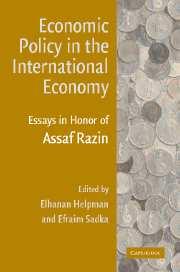Book contents
- Frontmatter
- Contents
- List of Contributors
- Preface
- Introduction
- PART ONE FINANCIAL ISSUES IN OPEN ECONOMIES: THEORY
- PART TWO FINANCIAL ISSUES IN OPEN ECONOMIES: EMPIRICS
- 5 Economic Integration, Industrial Specialization, and the Asymmetry of Macroeconomic Fluctuations
- 6 Uncovered Interest Parity in Crisis: The Interest Rate Defense in the 1990s
- 7 When Does Capital Account Liberalization Help More than It Hurts?
- 8 Sources of Inflation in Developing Countries
- PART THREE ECONOMIC GROWTH: THEORY AND EMPIRICS
- PART FOUR PUBLIC ECONOMICS
- PART FIVE POLITICAL ECONOMY
- Author Index
- Subject Index
5 - Economic Integration, Industrial Specialization, and the Asymmetry of Macroeconomic Fluctuations
Published online by Cambridge University Press: 03 November 2009
- Frontmatter
- Contents
- List of Contributors
- Preface
- Introduction
- PART ONE FINANCIAL ISSUES IN OPEN ECONOMIES: THEORY
- PART TWO FINANCIAL ISSUES IN OPEN ECONOMIES: EMPIRICS
- 5 Economic Integration, Industrial Specialization, and the Asymmetry of Macroeconomic Fluctuations
- 6 Uncovered Interest Parity in Crisis: The Interest Rate Defense in the 1990s
- 7 When Does Capital Account Liberalization Help More than It Hurts?
- 8 Sources of Inflation in Developing Countries
- PART THREE ECONOMIC GROWTH: THEORY AND EMPIRICS
- PART FOUR PUBLIC ECONOMICS
- PART FIVE POLITICAL ECONOMY
- Author Index
- Subject Index
Summary
We show empirically that regions with a more specialized production structure exhibit output fluctuations that are less correlated with those of other regions (less “symmetric” fluctuations). Combined with the causal relation running from capital market integration to regional specialization found in an earlier study, this finding supports the idea that higher capital market integration leads to less symmetric output fluctuations. This mechanism counter balances the effect of lower trade barriers on the symmetry of fluctuations quantified by Frankel and Rose (1998). It is further argued that more asymmetric output shocks do not necessarily imply more asymmetric income shocks, since more cross-country ownership of productive assets may actually render income shocks more symmetric despite the greater asymmetry of output shocks. Some evidence in support of this claim is reported. Deriving a simple closed form expression for the gains from risk sharing for CRRA utility is an independent contribution of the present article.
Much of the debate on the desirability of economic integration centers on the degree of synchronization (symmetry) of macroeconomic fluctuations across countries. It has been noted that the process of economic integration itself will affect the symmetry of macroeconomic fluctuations. Frankel and Rose (1998) argue that removal of trade barriers will entail more correlated business cycles, because a higher level of trade will allow demand shocks to more easily spread across national borders.
- Type
- Chapter
- Information
- Economic Policy in the International EconomyEssays in Honor of Assaf Razin, pp. 121 - 156Publisher: Cambridge University PressPrint publication year: 2003



